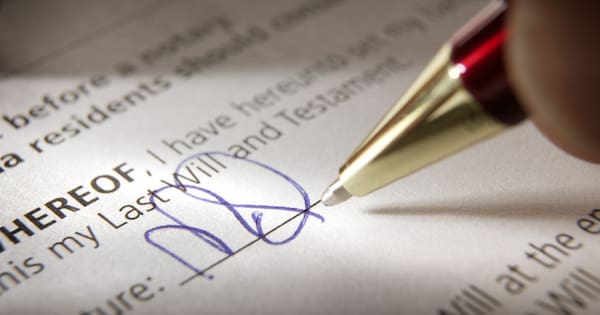Few of us have late pop star Liam Payne’s multiple millions, but Kiwis die without wills, as he did, every day. Disappointed partners and feuding family members can be left behind, and there’s no need, writes Frances Cook, when getting one sorted is often simple and cheap.
Got a KiwiSaver worth more than $15,000? Got kids? A family member that you don’t particularly like?
If just one of those fits, you need a will. And yet, stats from Public Trust are that 50% of us don’t have one.
A will is not just for rich people, old people, or those who are terminally ill. It’s for anyone who fits the above situations, as well as really, all of us, if you would like some clarity for your loved ones, should the worst happen.
Making a plan doesn’t have to be expensive, and it can certainly stop things getting messy. Want an example of “messy”? I’ve got five, where a will would have saved a lot of headaches.

1. You’re young(ish) and healthy, but have lots of money and a complicated relationship history.
Not all of us have $54.3 million lying around, but former One Direction star Liam Payne is still a case that should serve as a warning to the rest of us.
He died young, at 31, and without a will. His former partner Cheryl Tweedy is now legally responsible for his fortune, until his son turns 18.
Hopefully, this is what he would have wanted. But is it? Who knows.
He may have also wanted to leave something for his current partner. Or an organisation he worked with. It’s impossible to say.

Even if you’re not pop star famous, plenty of Kiwis can find themselves in a similar situation.
A bit of money tucked away, maybe enough for a house deposit, or your KiwiSaver, and a couple of serious relationships in the rearview.
If you die without a will, your assets will be divided according to New Zealand’s intestacy laws, which prioritise legal spouses and blood relatives.
That might leave out a partner who you never married and were with for under three years, or even a child if parenthood hasn’t been legally recognised.
Without a clear will, your personal history gets flattened into a legal template, and that rarely ends well.

2. You’ve repartnered in middle-age and at least one of you has adult children.
Blended families are common, but that doesn’t make the money side of things any easier.
Say you’ve moved in with a new partner later in life, and you at least one of you has children from a previous relationship.
If you die without a will, your partner (of three years or more) stands to get all of your personal possessions. That means cars, furniture, jewellery, all the stuff. Your kids could miss out on some items that have huge sentimental value to them, never mind the money side of it.

Meanwhile, the way the money is split is often that the partner gets a set dollar amount, up to $155,000, and then one third of the rest. The kids (including your partner’s kids) get the other two thirds.
Maybe you’re fine with that, maybe you’re not.
Or what if you were to die and leave your partner with your shared house with the understanding that, when they in turn pass on, they will leave that house to your children (their step children)? Well, they don’t have to. They could leave the proceeds from the sale of your house to the local cattery, and your children could inherit nothing, unless it’s stipulated otherwise in your will.
Disappointed partners and feuding family members can be left behind, and there’s no need, writes Frances Cook, when getting one sorted is often simple and cheap. (Source: Breakfast)
Personally, I think it’s worth ensuring things are left according to your wishes, not the government default. Especially when it comes to sentimental items.
3. You don’t want to leave your money to those who may expect it.
Family dynamics are, well, complicated at the best of times.
Not everyone wants their assets to go to the traditional next of kin. And there are plenty of times when you might want to ensure that, actually, a certain someone gets nothing.

Maybe you’re estranged. Maybe you’ve got friends, flatmates, or a charity that’s meant more to you in recent years.
If you die without a will, the law doesn’t care.
New Zealand’s intestacy (dying without a will) rules follow a hierarchy: spouse or partner, children, parents, siblings, then grandparents, uncles and aunts.
There’s actually not much flexibility to include anyone else, unless you’ve made a will that says otherwise.
And if you don’t want one of those people on the list getting anything? You doubly need to ensure that’s written down.

It’s not enough to casually mention your wishes in conversation. You need it in writing, signed by you in the presence of two witnesses, dated, and ideally done with a lawyer’s help.
4. You own property with someone you’re not married to, and the house isn’t in both names.
This one is increasingly common thanks to the state of house prices in Aotearoa.
Maybe you’re with a long-term partner, but you’re not technically de facto because it’s been a relationship for under three years. Maybe it’s a sibling or a friend, and you’ve bought a house together.
It happens for many reasons – that the house is shared financially, while the title is only in one person’s name.
If the person on the title dies without a will, their share of the house doesn’t automatically go to the co-owner, even if they live there, have paid the mortgage, and treat it as their home.
Instead, it will go through the estate process and follow the intestacy law hierarchy I mentioned above.
That could mean it’s inherited by a parent or child who has never lived there and your partner finds themselves without a home.

A will can prevent that mess entirely. It allows you to name who inherits your share of the house, and helps avoid expensive and emotionally fraught legal disputes.
5. You’re estranged from family, and don’t want them fighting over your estate
New Zealand law allows close family members, such as spouses, children, sometimes even stepchildren, to challenge your will under the Family Protection Act if they feel they’ve been unfairly left out, or not properly “provided for”.
This is why I keep mentioning a lawyer. Yes, you can find DIY will kits that let you draft a will for between $0-$100, and they’re certainly better than nothing.
But a lawyer only costs a little more, often between $250-$500, and they can help ensure your will isn’t challenged by entitled people once you’re gone.
Simple acts like writing a separate, signed and dated, letter of explanation can help a judge understand why you’ve made the decisions you have.
A lawyer can help you defuse bombs ahead of time, so that your wishes are respected once you’re gone.

So what actually makes a will valid in NZ?
It doesn’t have to be fancy. But it does need to follow the rules.
You must be 18 or older, and of sound mind. It needs to be written down, signed by you, and the signing must be witnessed by two people who aren’t inheriting anything from you (they will also sign it).
You can write a will yourself using templates, but given how much is at stake, it’s smart to get a lawyer or trustee service involved. Getting a will properly written up is actually not very expensive. It’s executing the will once you’re gone that’s expensive, so do it once, do it right, and it’ll be much cheaper at the end.
Because ultimately, having a will isn’t about doom and gloom.
It’s about protecting the people you love, and making sure your wishes still matter, even when you’re not around to explain them yourself.
The information in this article is general in nature and should not be read as personalised financial advice.
